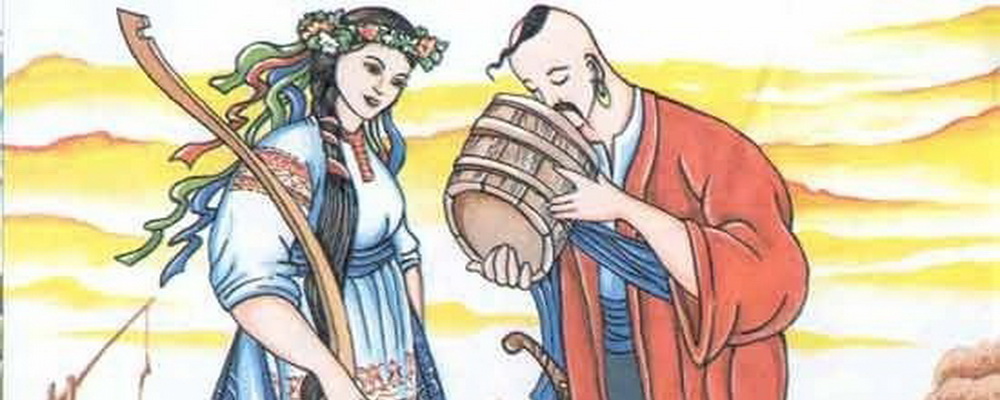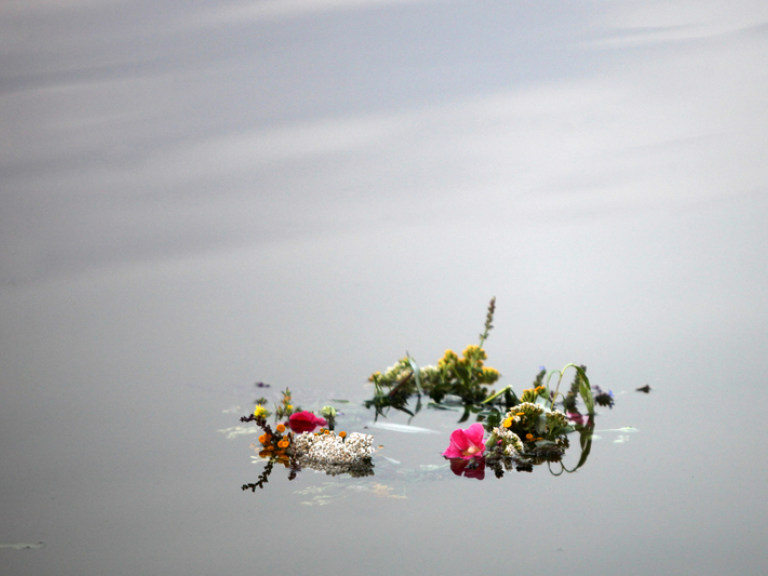The beginning of the literary work of Marco Vovchok came in the middle of the 19th century, when the democratic public advocated reforms and the abolition of serfdom. A prominent place in the writer's work is occupied by works for children, the social tale “Institutka” and “Folk Tales”. The first collection also included the story-ballad “Maxim Grimach”. Let's find out more about this ballad and its author.
Who is Marco Vovchok?
Ukrainian writer Maria Aleksandrovna Vilinsky was born in 1833 in the Oryol province in a noble family. Her mother was an educated woman and from childhood taught languages, music, and dance. At the age of 17, Maria married Afanasy Markovich, a Ukrainian folklorist and ethnographer.
In 1851, the Markovici moved to Chernigov. Afanasy Vasilyevich diligently wrote proverbs, sayings and folk songs. Mariya Aleksandrovna took part in ethnographic works of men and accompanied him on trips to the most remote corners of Ukraine. In the summer of 1856, Vilinsky was seized by an irresistible desire to express on paper her observations and impressions. Not attaching much importance to what was written, she showed everything to her husband. With a feeling of joy and surprise, he read the stories to mutual friends and, making sure that he was not deceived, sent a notebook to Petersburg to P. Kulisha. Soon several more stories were sent to Petersburg, among which was “Maxim Grimach” (below we will consider it in more detail).
What is she writing about?
In content, Ukrainian stories Marco Vovchok can be divided into two groups. In one, the writer depicts family relationships and the life of free Cossacks; in the other, serfdom or slavery with all the sad consequences; for the most part, the fate of the main characters is unhappy. This group includes, for example, the stories “Ransom”, “Kozachka”, “Gorpina”, “Father Andriy”, “Odarka”. The first group includes such stories: “Dream”, “Sister”, “Danilo Gurch”, “Mother-in-law”, “Chumak” and “Maxim Grimach”.
How does it write?
Vovchok tells how an eyewitness, close to the heroes by education and views, sharing their simple beliefs, sympathizing with their grief. The reader does not see the writer's thoughts, she does not express her feelings and does not stand out from the sphere that she describes. The author does not analyze the feelings of his heroes and does not reveal the state of their souls to the reader. She describes their words, actions, views, movements, but through them the entire inner world of the heroes is reflected. To get to know the writer’s work more closely, let’s take a closer look at the ballad story “Maxim Grimach”. Marco Vovchok was guided in her work by folk poetry and, referring to the long past, responded to the calls of the times.
Writing history
“Maxim Grimach” was published in the first volume of “Narrative Stories” in 1857 in St. Petersburg. The editor and publisher of the collection was P. Kulish. The action in the story takes place during the reign of Poland and Muscovy on the Ukrainian land. The main idea of the work is the condemnation of social inequality. It is based on the motive of romantic love (Katerina to Semyon), an obstacle to which was social inequality, which ultimately led to the suicide of the main character. The tragedy of the fate of the protagonist Maxim manifested itself when he lost his daughter Katerina: “My good child! I ruined your young years. ” According to literary critics, the work written by Marco Vovchok - “Maxim Grimach” - is a story with elements of romanticism. What are these conclusions based on? In their opinion, the elements of romanticism are:
- high moral qualities of the heroes: kindness, innate nobility, thirst for freedom, self-esteem, love of nature;
- the ability to observe and correctly evaluate the surrounding reality;
- sincere tone of the narrative;
- resigned submission of the main character to the circumstances.
The author raises in the work not only the problem of social inequality, but also the eternal problem of “fathers and children”.
The plot-compositional analysis of "Maxim Grimach"
Marco Vovchok begins the story with a description of the situation, against which the main action develops. The exposition of the work refers to this time: “long ago, when Poland and Muscovy reigned in Ukraine”, “the outposts were at least standing, but not densely”, “the watchmen did not follow as they are now.” The plot of the story is Catherine’s love for Semyon and his departure for the campaign. The climax - because of the death of her beloved Katerina, she commits suicide. The denouement is Grimach’s suffering and sadness due to the death of his daughter.

The story consists of five parts. The first acquaints with the main character Maxim and his family - he lived “against Cherkasy” and “had two daughters”, “one is already an adult girl”, “the second is a teenager, not big.” In the second, the author introduces Katerina’s lover, Semyon, so that Grimach agrees to their marriage with Katerina, he leaves for the last trip: “I have to wait,” “I’ve been serving for the third year, the last.”
In the third part, the girl waits for the return of her beloved: “walks”, “from the Dnieper ... does not take her eyes off”, “embroiders ... sleeves and towels”, “looks out the window”, but finds out that he died - “there is nobody” , "Only the Dnieper carries broken boats." In the story “Maxim Grimach,” the author, describing the storm on the Dnieper, uses metaphors: “the rain of reeds has cut”, “the Dnieper throws sand out of the bottom”; repetitions - “dark-dark”; hyperbole - “how thunder will strike”; comparisons - "cut as a saber."
In the fourth part, Katerina suffers, “smoothed the braid of the light brown one minute”, “looked at all sides and rushed to the very depths”. The fifth part tells about the pain and sadness of the father and sister of the girl.
Short retelling
Maxim Grimach is a wealthy host. The widower brings up two daughters - Katya and Tatyana. They lived with their father in luxury. The elder Katya fought back to the suitors, but Semyon fell in love and began to meet with him secretly from everyone. Lovers understand that the father will not give consent to their marriage, although he said that he would not force, but he would not give up for the tramp. Semyon reassured his beloved, said that he would last with his master for the last year, get freedom and send matchmakers. He told her to wait for spring: when the first cherry blossoms, she will come by a free cossack. Waiting for Kate, looking out the window.
So the cherry blossomed, but the seeds were still gone. She heard how one Kozak told her father that there was a big storm on the Dnieper and that all the boats were broken. Katya was sad - the father of a free son-in-law waited. The girl weaves a wreath, and nothing pleases her. I went at night under the willow and rushed into the river. In the morning they made a noise - they are looking for Katya. But they found only a wreath. Five years old Grimach did not go out of the gate. The youngest daughter Tatyana grew up, she married a centurion, a good man. But sadly to Maxim - looked at the river - tears are rolling.
The main characters and their characteristics
In the center of the story is the love of Katerina, the eldest daughter of the protagonist, and the serf Semen. The main character of the story, Katya’s father is Maxim Grimach. Vovchok, reveals the inner world of his heroes through words, deeds and views. So, in front of them are three central characters:
- Grimach - “black-browed, black-browed”, “cheerful” “hero”, “walks in caftans, in morocco and in atlases”. He was very fond of people: "it happened that it will come out on Sunday, so they will surround him." He came to all to the rescue: "only to whom an adventure happens - he will lay his head and save." Respected and greeted Kozakov: "leads them into the room and accepts what is needed." He loved his daughters very much: "they lived with their father in luxury." I wished my children happiness: “I won’t give for a tramp”, “for a free Cossack”, “so that he would be his master”. But Maxim didn’t like when they cross over to him: "my word is parental, strong." He grieved over the death of his daughter, "walks around without a hat, disheveled", "for five whole years he did not go out of the gate." I celebrated the youngest daughter "a loud wedding", "walked for a week." But the father’s heart grieved for the eldest daughter: “looked at the Dnieper”, “remembered” “the daughter” and “tears rolled down the gray mustache”. He blamed himself for the death of Katerina: "I ruined your young life."
- Semyon - “handsome guy”, “brave as a falcon”, with self-esteem: “I will serve the last year”, “I will not sail to you as a hired man - a free Cossack” and then “I will bow to your father”. He loved Katerina and walked towards his goal: "does not swim - Semyon flies."

- Katerina - “good and magnificent, like a queen”, lived with her father in luxury. Proud girl, other guys wooed her, but she did not look at them: "I do not care that they are young and good when my heart does not reach for them." Katerina loved Semyon with all her heart: “she walks and does not take her eyes off the blue Dnieper”, “she looks intently, if the boat is sailing”, “does the stately and expensive Cossack rule it”. Katerina is a craftswoman: embroiders with silk. After the death of her beloved, she reproached her father: “Now the free Cossack is my fiancé, dad! My own son-in-law waited. ” Purposeful, principled girl gathered on the Dnieper, “cleaned up beautifully”, put on “silk shirt”, “silver belt”, “tall little cherries”, “the smallest braid of light brown braided” and “golden ring on her right hand”. To unite with the soul of Semyon, "she looked in all directions and rushed to the very depths."
Marco Vovchok - one of the first writers who touched on the issue of serfdom in her works. In her simple and true stories, she turned out to be a skilled fighter in this field. Without flaunting "pansky power", she without anger and bitterness painted the situation of peasants. Her works show sympathy and warm love for the people, the denunciation of serfdom and the concepts generated by it.